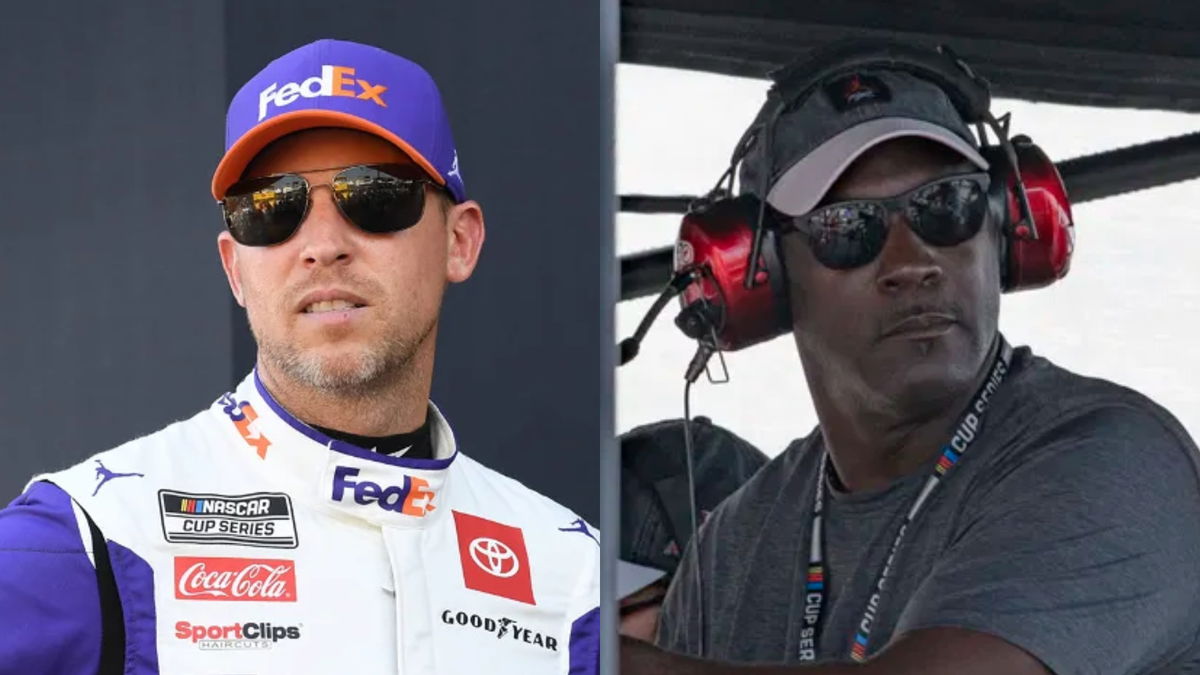
Imago
Image Credits: Imago

Imago
Image Credits: Imago
23XI Racing, co-owned by Michael Jordan and Denny Hamlin, and Front Row Motorsports continue their high-stakes antitrust lawsuit against NASCAR. The teams challenged NASCAR’s charter system, arguing it unfairly restricts competition. Recently, a federal judge denied their request for a temporary restraining order that would have allowed them to maintain chartered status through the season. As a result, six cars from the two organizations must now enter upcoming races, including Indianapolis, as open entries, subject to qualifying on speed and without guaranteed payouts.
Watch What’s Trending Now!
Despite the setbacks, Hamlin remains defiant. “If you want answers, you want to understand why all this is happening, come Dec. 1, you’ll get the answers that you’re looking for,” Hamlin said before the race at Dover Motor Speedway. “All will be exposed.” Racing without charters places serious pressure on both teams’ operations. Charters guarantee spots in the race and baseline earnings. Drivers like Tyler Reddick, Bubba Wallace, Riley Herbst, Noah Gragson, Todd Gilliland, and Zane Smith now face the real risk of being bumped if more than 40 cars attempt to qualify on speed. But a new revelation from NASCAR says otherwise.
How NASCAR’s midseason rulebook change may influence the courtroom showdown
In a dramatic swing, NASCAR flipped the script and updated the rulebook with Rule 5.1.F and Rule 7.9.1.1. A newly added provision gives NASCAR the discretion to cap race entry at 40 cars, and when doing so, to reserve spots for open teams based on owner points. This blanket update ensures Jordan’s 23XI team and FRM will be locked in, providing a lifeline while the charter battle unfolds. As noted by analysts and the teams involved, this is more than procedural fine-tuning; it is a strategic move to avoid irreversible harm to plaintiffs during a volatile legal season.
Veteran NASCAR reporter Bob Pockrass also emphasized the impact on the courtroom narrative: “Because 23XI/Front Row argue irreparable harm if they aren’t guaranteed a spot in the race…, this makes that part of the argument moot. Will be interesting to see if 23XI/FRM continue to seek preliminary injunction.” Under the open-entry structure, only up to 4 non-charter teams could gain entry via fastest-lap qualifying, while the remaining two spots were decided by owner points.
NASCAR has updated the rule book to state that they can limit race entries to 40 teams, with Open teams based on owner standings.
This would prevent 23XI Racing and Front Row Motorsports from missing a race this year while the lawsuit is pending. pic.twitter.com/VzMliiTB1E
— Jayski (@jayski) July 21, 2025
The fragility of open-team qualifying was underscored at the Chicago Street Race. A 23XI-affiliated Xfinity team, driven by Corey Heim, failed to qualify after being ousted on open-entry time, serving as a cautionary tale for full-time Cup drivers like Tyler Reddick and Bubba Wallace. On the other hand, FRM entered the fray with a slight cushion: their own standings, bolstered by inherited charter-origin owner points, frequently placed Zane Smith and Todd Gilliland securely within the top 6 open-team categories. The buffer means consistent qualifying performances, such as Smith’s dominant Talladega pole earlier this season, translate directly into starts rather than do-or-die speed runs.
23XI drivers have experienced high highs and low lows on qualifying day. Tyler Reddick and Bubba Wallace locked the front row at COTA, sweeping the top two positions. But Riley Herbst’s qualifying at times painted a bleaker picture; slots in the 30s at Dover and Darlington highlighted how quickly fortunes can shift. More significantly, Reddick and Wallace both signed contracts with 23XI that include binding relief clauses tied directly to charter status. These clauses stipulate that if the team is stripped of a chartered entry, they are allowed to exit their agreements and become free agents.
With a full trial scheduled for December, the legality of charters remains unresolved. But for now, NASCAR’s new rules ensure that even charter-less teams will take the green flag, preserving their competitive and commercial footing.
France family stays at helm as ownership rumors are dispelled
After months of mounting speculation, NASCAR President Steve Phelps has silenced the noise. “We are privately held by the France family, and we’re not interested in selling,” he told Puck News, firmly rejecting rumors that the family might part with a stake in the sport. Those rumors, fueled by a February 2025 report, raised concerns that private equity might steer NASCAR into unfamiliar territory.
The clarification offers reassurance to fans and insiders who see the France family’s long-held stewardship as central to NASCAR’s legacy. While they have weathered storms like the 2008 financial crisis and ushered in major innovations like the Next Gen car, the current climate, marked by legal battles, shifting media trends, and rising costs, demands adaptive leadership. Yet the France family appears committed to tackling these hurdles on their own terms.
Still, NASCAR isn’t closing its doors to outside capital entirely. “Private equity can play a valuable role in our sport by investing in teams, bringing in new sponsorships, and providing expertise,” Phelps added. The sport is already seeing this through partnerships like Knighthead Capital with Legacy Motor Club and new sponsorships with Joe Gibbs Racing. By keeping the sanctioning body under family control while encouraging team-level innovation, NASCAR seems intent on evolving without losing its soul.








